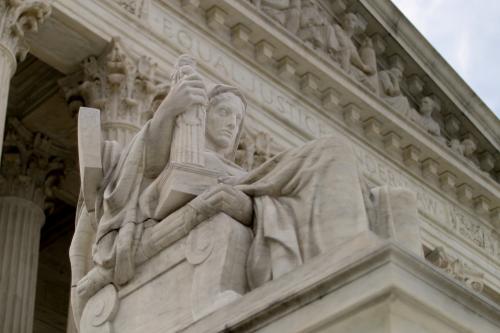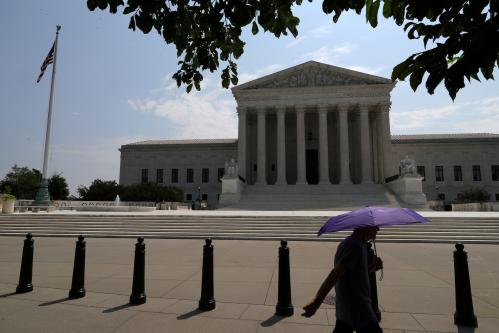The author notes that at the time of this writing, Trump’s lawyers’ brief in Vance indicated that the grand jury subpoena was the only one seeking Trump’s tax return. However, the Supreme Court’s description of the subpoenas at issue in Mazars indicates that least one House subpoena did seek to acquire Trump’s tax returns.
The Supreme Court, perhaps as early as tomorrow, is expected to hand down its decisions in two cases (Trump v. Mazars and Trump v. Vance) involving subpoenas for President Trump’s financial records. One set of subpoenas, issued by several House committees, seeks to acquire records relating to the president’s finances and businesses from his accounting firm, Mazars, and from two banks with which Trump has done business. The other set of subpoenas, issued in the name of Cyrus Vance, the District Attorney for the County of New York, seeks the same records the House committees has requested, as well as eight years of Trump’s business and personal tax returns. Both Mazars and the banks have indicated that if the Supreme Court so rules, they will turn over the subpoenaed records.
The concerns suggested by the justices’ comments in oral argument, as well as the strength of the legal cases Trump can mount, suggest he has a better chance of prevailing in Mazars and its companion case, Deutsche Bank, than he does in Vance. However, even if Trump loses both cases, it is unlikely that most Americans will see Trump’s tax returns any time soon.
The House subpoenas do not seek Trump’s tax returns, although they seek extensive records relating to Trump’s business affairs, and it is possible that these may yield information that will relate to what Trump’s tax returns might show. There is a case that might require Trump to provide the House with his tax returns, but it is at an earlier stage in the litigation process and will not be resolved this term. This means that even if Trump’s arguments in Mazars are rejected, copies of his tax returns will not be given to any House committee.
The situation in Vance is different. If Trump does not score at least a partial victory in this case, we can expect that his tax return information will be turned over to Vance. This does not, however, mean that anyone outside of a narrow group of people will ever see them. Cyrus Vance is seeking Trump’s returns in connection with a grand jury investigation. In most jurisdictions, including New York, information collected for use in grand jury must by law be kept secret from the public and the press. Although, as one justice pointed out in oral argument, leaks from grand juries do occur; representations made by Vance’s attorney in oral argument to the Supreme Court will place strong pressure on Vance and his office to ensure that information about the contents of Trump’s tax returns does not leak from the grand jury room. Hence it would be surprising if anyone not involved in the grand jury investigation acquires copies of Trump’s tax returns.
In New York and elsewhere there are, however, ways in which presumptively secret grand jury information may legally be revealed. In particular, the judge supervising the grand jury has discretion to approve requests to reveal grand jury information if she believes that the public interest in disclosure outweighs the considerations that underlie grand jury secrecy. Also if an indictment issues, documents and other evidence acquired by the grand jury may be used in prosecuting the case, and in announcing an indictment a prosecutor may indicate some of the evidence on which it is based. Moreover, if an indictment does not issue, some reasons for maintaining grand jury secrecy; e.g., to avoid alerting a person that he is a grand jury target, disappear, and the balance favoring disclosure increases. But none of these possibilities should make the curious optimistic about the likelihood that their curiosity will be satisfied anytime soon.
The politics of the situation are such that a supervising judge is unlikely to approve the release of Trump’s tax return documents. “I think the electorate should know of the tax dodges Trump has employed before the next election” is not the kind of reason a judge can give, whether or not the grand jury has issued indictments. If information drawn from Trump’s returns figures in an indictment of someone other than the president, Vance might be able to reference this information in announcing the indictment, or it might even be mentioned in an indictment that names Trump an unindicted coconspirator, but most of what Trump’s tax returns might tell us would remain hidden. Whether the president himself can be indicted while in office is an open question, but it appears Vance is unlikely to go there, even though he has been unwilling to disclaim the possibility. Moreover, if the grand jury indicted Trump, much of what is in his return would be irrelevant to any crime charged.
If Vance is allowed to acquire copies of Trump’s tax returns, a number of people will be able to inspect copies. Leaks then are not unthinkable, but they are unlikely. Similarly, leaks from people at Mazars with access to Trump’s tax returns are also possible but unlikely. Leaks from Mazars could have happened already. In short, even if the Supreme Court rebuffs Trump’s claims in Vance, don’t hold your breath awaiting more information about his tax returns. Most likely, it will be a while before we know any details, and portions of his returns may remain forever secret.
The Brookings Institution is committed to quality, independence, and impact.
We are supported by a diverse array of funders. In line with our values and policies, each Brookings publication represents the sole views of its author(s).







Commentary
Waiting for Trump’s tax returns: Don’t hold your breath
June 29, 2020